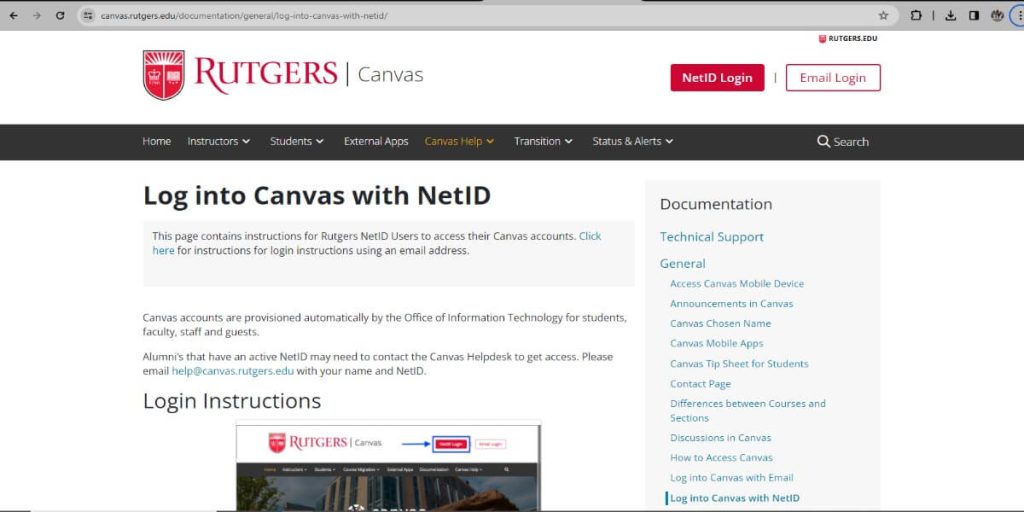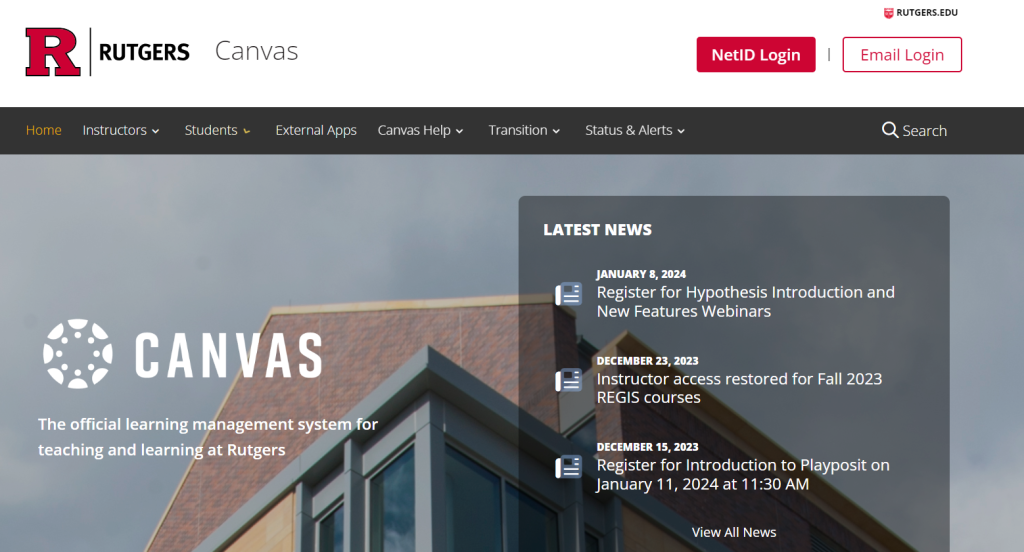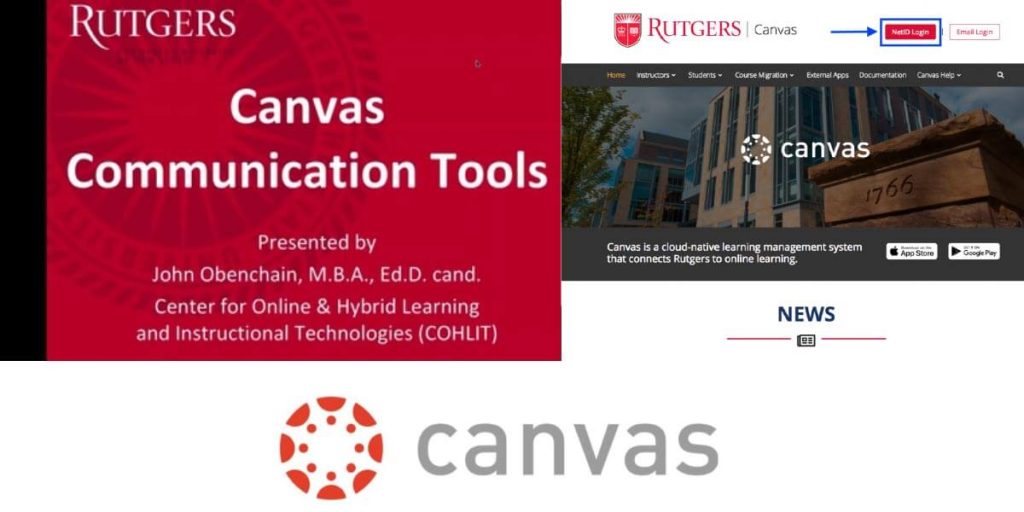Rutgers Canvas is an online learning management system that enables students to study classes via the Internet at Rutgers University. Teachers can keep track of their student’s grades during class discussions and assignments because of its powerful grade book. All the information about course materials, assignments and activities, etc is available on Canvas in one place at Rutgers University.
To stay abreast of the ever-changing landscape in online higher education and give students a superior learning environment, platforms such as Rutgers Canvas are essential. It is fundamentally targeted at teachers and pupils of Rutgers University who wish to optimize their use of this amazing digital teaching instrument.
What Exactly is Rutgers Canvas?
Rutgers Canvas, an LMS developed and hosted in the cloud by Instructure, is responsible for managing all of Rutgers University’s online courses. A number of crucial features of Rutgers Canvas include:
Places To Take Classes:
Online classrooms allow instructors to design lessons with syllabi, learning modules, assignments, tests, and more.
Methods Of Expression:
The app’s built-in chat, email, video conferencing, and message boards make it easy for teachers and students to keep in contact. Shared files provide course resources for students such as readings, lecture notes, and syllabi. In the case when teachers utilize technology to create, distribute, and collect assignments students get new ways to submit paperwork; evaluate it, and get feedback.
The Canvas app enables the students and their instructors to use any mobile device anytime to access courses. The guidebook is one of the tools that assist teachers in monitoring their students’ performance by recording grades, weights, and total scores. With the help of analytics that bring out essential data on student and course performance, enhance your instructional strategies as well as pedagogical support systems.
All the necessary dates and events for your courses are recorded in a calendar that can be customized.
Rutgers Canvas adheres to the WCAG 2.0 AA since all students should be able to use it. The strong digital tools and unified, intuitive interface of Rutgers Canvas enable more convenient learning.
Rutgers Canvas Login Options
There are two primary methods for logging into Rutgers Canvas:
NetID Login
This is the preferred method for Rutgers students, faculty, and staff.
- Visit https://canvas.rutgers.edu and click the “NetID Login” button.
- Enter your Rutgers NetID username and password, then click “Login.”
Your Rutgers NetID credentials are issued upon admission/employment and used to access various university systems and services beyond Canvas.
Email Login
This alternative is for non-credit/guest users who do not have a Rutgers NetID.
- On the Canvas login page, click the “Email Login” button.
- Enter the email address used for your Canvas profile and your Canvas-specific password, then click “Login.”
- Email login accounts must be created separately through the Canvas website.
Using the NetID option if eligible to simplify the login process is advisable. Be sure to have accurate login credentials ready before accessing Canvas. Two-factor authentication is also encouraged for additional cybersecurity.
Accessing Rutgers Canvas
To access Rutgers Canvas, follow these basic steps:
- Open your preferred web browser (Chrome, Firefox, Safari, Edge) on your computer or mobile device.
- Navigate to https://canvas.rutgers.edu.
- Click the “NetID Login” or “Email Login” button in the top-right corner.
- Enter your Rutgers NetID/email address and password.
- Click the “Login” button.
You’ll be directed to your Canvas dashboard homepage upon successful login.
A few notes about accessing Canvas:
- Canvas is mobile-friendly, and the website and app can be used on any device.
- Bookmark or save the Canvas URL for easy future access.
- Clear your browser cache if encountering login issues.
- Contact the Canvas Help Desk with any technical problems.
- An active Rutgers NetID or Canvas account is required for login access.
That covers the basic process. Let’s explore the Canvas interface and key areas in more detail.
Navigating the Rutgers Canvas Dashboard
You’ll be taken to your personal Canvas dashboard homepage upon logging in. This central hub gives you quick access to your courses, calendar, messages, and account settings.
Left Sidebar
The left sidebar contains the main navigation links:
- Courses: View and access all courses you are enrolled in.
- Calendar: See critical due dates and events on your calendar.
- To Do: Check tasks needing completion, like upcoming assignments.
- Inbox: Access course-related messages and conversations.
- Profile: Update your Canvas profile photo and configure notifications.
At the top, you’ll find the global navigation bar with links to Home, Account, Help, and Logout. Additional icons provide quick access to Notifications, Inbox, and Profile.
The dashboard homepage displays upcoming assignments, recent announcements, and other personalized widgets pulling data from your courses. Instructors have additional admin-focused widgets and links.
Take time to familiarize yourself with the interface and critical areas. Contact your instructors if you need help navigating Canvas or accessing course materials. The intuitive design makes the system easy to learn and use with regular use.
Common Rutgers Canvas Tools
Beyond the dashboard, several core tools power the teaching and learning experience within individual Rutgers Canvas courses:
- Syllabus: View the course outline, schedule, policies, and instructor details.
- Modules: Access sequenced lessons, lectures, and assignments grouped by topic or week.
- Announcements: View recent notices from the instructor on course news or updates.
- Discussions: Participate in open-ended question forums to share ideas with classmates.
- Assignments: Submit and receive feedback on essays, problem sets, and other work.
- Quizzes: Take timed online assessments on course material with automated grading.
- Grades: Monitor current and final grades recorded by the instructor in the gradebook.
- Files: Access important documents like lecture notes, readings, and handouts.
- Conferences: Join virtual class meetings through video, audio, and screen-sharing tools.
- Wiki: Collaboratively edit and contribute to course pages in a free-form manner.
Instructors may use all or some of these tools based on course needs. Explore each area to understand requirements and learn where to find resources. And don’t hesitate to contact instructors if you have any other questions!
Read More: How to Choose the Best Online Course for Your Career Goals
Rutgers Canvas on Mobile Devices
One advantage of Rutgers Canvas is its fully responsive web interface that adapts to any device screen size, making it highly mobile-friendly. However, for even better on-the-go access, the free Canvas app is also available:
- Download the “Canvas by Instructure” app from the App Store or Google Play.
- Open the app and enter your Rutgers NetID or Canvas email login credentials.
- All of your courses will sync and be accessible just like on a desktop.
- Complete assignments, view announcements, participate in discussions, and more.
- Stay on top of due dates and notifications with the app’s calendar and alerts.
- Seamlessly switch between the mobile app and the entire website without missing a beat.
Having the Canvas app installed allows you to remain engaged and productive even when away from a computer. The intuitive mobile interface optimizes the experience for phones and tablets.
Getting Help with Rutgers Canvas
Though largely intuitive, it’s understandable to have the occasional question when starting with Rutgers Canvas. Help is always available:
Check the comprehensive online documentation at https://canvas.rutgers.edu/documentation for guides and tutorials. Contact the Canvas Support team by phone, email, or web form submission. Details at https://oit-help.rutgers.edu/canvas. Post a question on discussion boards if your instructor has created a “Help” topic.
Consult the 24/7 Canvas Guide chatbot within the app for quick answers. Visit one of the Rutgers libraries for in-person tech support assistance if needed. Explore Canvas features like the Guided Tour that provides contextual help. Consult the Canvas Community site for answers from other educators and students.
Don’t hesitate to reach out: Rutgers commits to your success with Canvas. With some practice and available support resources, you’ll be a pro in no time.
Conclusion
Rutgers Canvas provides a centralized, robust online teaching and learning platform. Its intuitive interface and powerful tools streamline the academic experience when appropriately utilized.
With the guidance provided in this comprehensive guide, you now have the necessary information to confidently log in, navigate, and make the most of your Rutgers Canvas courses. Feel free to explore features independently while using the excellent support resources available.











